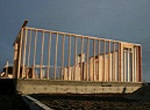How A Faith Based Community Development Corporation Differs from Other CDCs
Last Updated: June 9, 2024
If you are involved with a faith based community development corporation, sooner or later someone will ask you how the nature of your parent organization makes it different from what other CDCs might do.

Or another way to ask this is to see if you know if the multi-family development shown on this page was built by a religious non-profit.
The answer is yes, incidentally. But you would not know that unless a sign or the name of the building tells you so.
From time to time we have thought about how the Christian CDC might differ from a typical community development corporation, if the work itself is the same. The obvious answer is that an organization with a specific religious identity will be judged by how well it adheres to the highest principles evoked by that religion.
When this page was written originally, I had no direct experience with a CDC owned and operated in a different faith tradition, but some recent consulting has given me the depth to understand that the issues are similar across the great religions.
If it is operating the way it should, such a CDC also will evaluate itself and its own projects by those same principles of behavior and motivation. If boldness is part of the religious teaching, and certainly this is true of Christianity and many other religions, then boldness should be exemplified in the community development program.
Probably none of you will disagree with this very general description. The less palatable truth is that regardless of whether you are with a faith-based corporation, you are not immune from the ordinary laws of cause and effect, and from the ever-present need for money for your community improvement projects.
This is where some groups have trouble, at least upon start-up. There is a tendency to think that because we are doing God's work, Allah's work, or whatever, the laws of nature will be suspended to assure that the new venture works splendidly. I observe that at least in my faith tradition, this does not happen very often. We are allowed to fail if we act without due deliberation, information, discussion with the community, and reflection.
How a Faith Based Group Might Differ
A faith based community development corporation might differ from one with an officially secular orientation in these ways:
- Mission. The mission of a faith group's community development corporation may be fairly process-oriented, as opposed to the outcome orientation of other corporations. This certainly isn't true in all cases, but visible results may be slightly less important to the faith-driven entity.
- Values. If and when the board discusses the values that will govern their work, we would hope that love, kindness, justice, hope, and seeking to understand are mentioned prominently. We would hope that intentionality about racial equity and community development would go hand in hand in the work of any faith group. Secular groups may follow a conscious sense of seeking justice for underserved minorities, for example, but less commonly think about the ways the board members treat one another and the population being served. Usually a religious group will have a longer list of values to maximize.
- Methods. Our experience is that a faith group is extremely conscious of the ethical implications of its means of diagnosing and attacking problems, and providing solutions.
- Board and Donor Motivation. Because the motivational structure is different, a faith organization's community development corporation may attract loyal board members and financial contributions far exceeding what those same donors might support for secular reasons.
- Evaluation. The value of a particular project may be judged at least partially on the basis of factors such as how persons impacted are able to advance in their development as ethical and loving human beings as a result of the project.
- Orientation toward money. While keeping the organization solvent and earning funds when possible are important to all civic-minded corporations, this shouldn't ever be a contest, the only goal, or even the primary goal for a Christian or other faith-based CDC.
Nine Pieces of Advice for the Faith Based Community Development Corporation
We leave you with some thoughts as you set up, evaluate, or plan for a Christian, Jewish, or Muslim community development corporation. In fact, these could form a discussion agenda as you conclude or begin a new year. Adapt these thoughts to reflect your own frame of reference better.
- Consult with and take advantage of any and every resource your larger faith community or denomination may offer. For example, many Christian denominations have what we might generically call church building loan funds, and some of these lend money on favorable terms for housing or even commercial development projects that their congregations back. You may have to push the envelope to get these funds to consider a project that is not affiliated with a specific congregation though.
- Remember that in community work, none of us want to be judged solely by our results. For both the secular and the religiously motivated activist, to some degree it's our "doing what we can" or "doing what we should do" that counts.
- Keeping our egos out of the way is incredibly important in this work. Pastors, rabbis, imans, and other leaders, this means you. We need enough confidence and sense of agency that we take action appropriately. But when we do it for glory, even when it is glory within the faith group, that effort is going to make people upset and result in less productivity for our cause.
- Courage and vision are indispensable in all aspects of community development work. If that courage and vision are bolder and brighter due to the faith of a leader, so much the better. Cultivate both traits.
- Incompetence in uncovering and dealing with root causes of urban problems and opportunities is not easily overcome, regardless of religious identification. We have encountered religiously motivated persons who want to become non-profit developers, but who are always surprised when their naive expectations are not met. Learn from secular sources, including this website, and place a high priority on networking through an organization such as the Christian Community Development Association. Motivation is not enough in community development work, and motivation plus money isn't enough either. You have to understand the likely impacts of actions you take.
- Similarly, a Christian community development corporation must be just as astute about how to start a community development corporation as a group that is not affiliated with a faith.
- Community development often is the work of the idealist, whether religiously motivated or not. If the individuals involved are self-righteous and self-promotional rather than pursuing eternal principles, eventually that will be exposed. Just take care that the idealism that is almost necessary to keep plugging away at incorrigible community problems does not become a liability in sound decision making.
- Early in the decision making process, think through how you will approach the subject of government funding. Are you opposed to accepting any and all grant funds, or only government grant funds? Are you going to stand in the way of someone using a government-issued housing voucher to rent an apartment that you develop? Are you willing to become involved in more advanced financing methods, such as tax increment financing, which is just another form of government subsidy, by the way?
- Lastly, don't expect the pastor, priest, or other faith leader to take on a major role in performing the work of the CDC (although do put him or her on the board). Even in the unlikely event that the pastor's education included some emphasis on urban ministry, the years since seminary usually have brought new ideas and programs to the community development field. Specialized knowledge is required. Not to mention, almost every faith community has more than enough work to do already. Hire an employee; if you can't afford it, you probably can't afford to form a CDC and should consider partnering with other groups in your area. For a lower-budget option, consider a partially funded government program providing relatively short-term employees, such as AmeriCorps in the U.S.
Read These Pages Relevant to All Community Development Corporations
- A Good Community Home >
- Community Organizations > Faith-Based Community Development Corporation
Join GOOD COMMUNITY PLUS, which provides you monthly with short features or tips about timely topics for neighborhoods, towns and cities, community organizations, and rural or small town environments. Unsubscribe any time. Give it a try.




